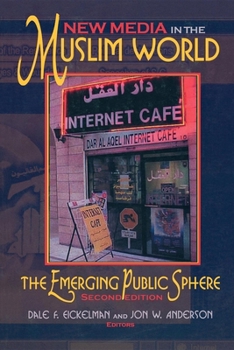New Media in the Muslim World, Second Edition: The Emerging Public Sphere
(Part of the Middle East Studies Series)
Select Format
Select Condition 
Book Overview
"It is difficult to imagine a more thoughtful, balanced, or comprehensive treatment of this extremely elusive and difficult subject." --Digest of Middle East Studies
This second edition of a widely acclaimed collection of essays reports on how new media--fax machines, satellite television, and the Internet--and the new uses of older media--cassettes, pulp fiction, the cinema, the telephone, and the press--shape belief, authority, and community...
Format:Paperback
Language:English
ISBN:0253216052
ISBN13:9780253216052
Release Date:July 2003
Publisher:Indiana University Press
Length:240 Pages
Weight:0.85 lbs.
Dimensions:0.7" x 6.4" x 9.2"
Grade Range:Postsecondary and higher
Related Subjects
Arts, Music & Photography Communication & Journalism Communication & Media Studies History & Criticism Media Studies Political Science Politics & Government Politics & Social Sciences Public Affairs Public Affairs & Administration Public Affairs & Policy Social Science Social SciencesCustomer Reviews
1 rating
Enjoyable and informative
Published by Thriftbooks.com User , 24 years ago
I most enjoyed reading New Media in the Muslim World. This bookexamines the recent introduction of mass education and theavailability of new media (including: fax machines, private and satellite Television channels, internet, desktop publishing as well as video tapes and telephone) in the Muslim World. These new media challenge existing modes of governmental and religious authority and creates new discursive spaces for the articulation of ethnic and religious identities. This work starts with three theoretically oriented chapters and continues with ethnographies. All case study presented in the collection are immensely relevant to new media researchers, although only one of them deals specifically with the Internet. Other themes consist of: the continuity between old and new in popular culture (Armbrust), interactions between technology and culture in the new "communication ecology" (White), how new communication networks have de-centered debates on the construction of ethnic identity to Europe (Yavuz), the narrowing gap between broadcast production and audiences and the intellectualization of Islamic discourse (both by Eickelman), the discovery of the civil society as a topic for debate in the Muslim world (Norton), etc. One of the book's strengths is that no simplistic causal link is assumed between new communication technologies and their social impact. The essays are informed by a rich ethnographical context and an understanding of larger social and political. This book comes to fill this gap with case studies of regions as diverse as diverse as Indonesia, Bangladesh, Turkey, Iran, the Arab world, and the United States...





